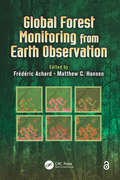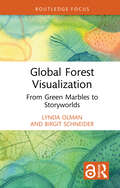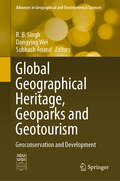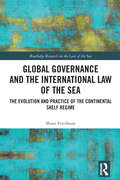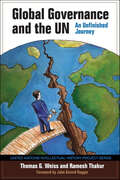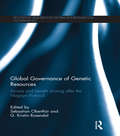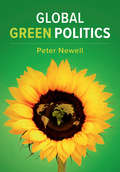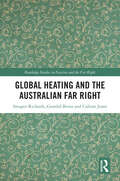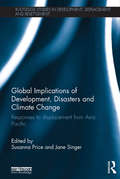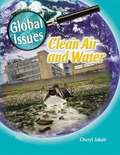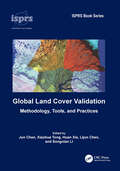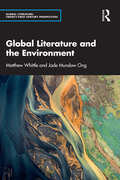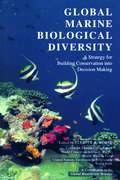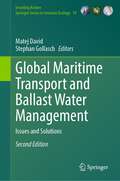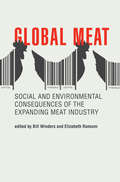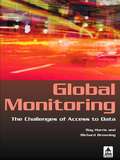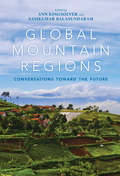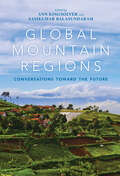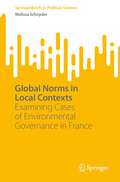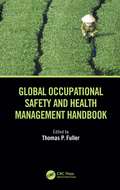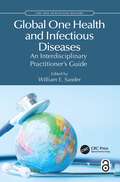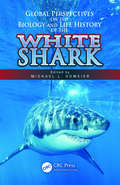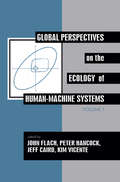- Table View
- List View
Global Forest Governance and Climate Change: Interrogating Representation, Participation, And Decentralization (Palgrave Studies In Natural Resource Management Ser.)
by Emmanuel O. NuesiriThis edited collection assesses governance in forestry programmes and projects, including REDD+ governance. It examines political representation, participation and decentralisation in forest governance, providing insight as to how forest governance arrangements can be responsive to the socio-economic interests of local people and communities who live adjacent to and depend on forests.Global Forest Governance and Climate Change argues that inclusive complementary representation of local communities is required for strong participatory processes and democratic decentralisation of forest governance. Responsiveness to local people’s socio-economic interests in forestry initiatives require paying attention to not just the hosting of participatory meetings and activities, but also to the full cast of appointed, self-authorized, and elected representative agents that stand, speak, and act for local people. This book will be of interest to students and academics across the fields of climate change governance, forestry, development studies, and political economy. It will also be a useful resource for policy makers and practitioners responsible for forestry and climate change initiatives.
Global Forest Monitoring from Earth Observation
by Frédéric Achard • Matthew C. HansenCovering recent developments in satellite observation data undertaken for monitoring forest areas from global to national levels, this book highlights operational tools and systems for monitoring forest ecosystems. It also tackles the technical issues surrounding the ability to produce accurate and consistent estimates of forest area changes, which are needed to report greenhouse gas emissions and removals from land use changes. Written by leading global experts in the field, this book offers a launch point for future advances in satellite-based monitoring of global forest resources. It gives readers a deeper understanding of monitoring methods and shows how state-of-art technologies may soon provide key data for creating more balanced policies.
Global Forest Visualization: From Green Marbles to Storyworlds (Routledge Focus on Environment and Sustainability)
by Birgit Schneider Lynda OlmanThis book project examines global forest monitoring as a means to understand the promises and problems of global visualization for climate management.Specifically, the book focuses on Global Forest Watch, the most developed and widely available forest-monitoring platform, created in 1997 by the World Resource Institute. Forest maps are always political as they visualize power relations and form the grid within which forests become commodities. This dislocation of the idea of the forest from its literal roots in the ground has generated problems for forest visualization efforts designed to empower local communities. This book takes a critical humanistic approach to this problem, combining methods from the fields of rhetoric and media studies to suggest solutions to these problems for designers and users of platforms like the Global Forest Watch. To explain why global views of forests can be disempowering, the book relies on biopolitical and rhetorical theories of panopticism and how these views unfold a different violence on different regions of the Earth in relation to colonial history. Using this theoretical framework, the book explains the historical process by which forests came to be classified, quantified, and mapped on a global scale. Interviews with end-users of global forest visualization platforms reveal if and how these platforms support local action. Lastly, the book provides rhetorical solutions to articulate global and local views of forests without reducing one view to the other. These solutions involve looking to forests themselves for clues about how to generate more broadly effective and resilient visualizations.This book will be of great interest to students and scholars of forest studies, climate change, science communication, visualization studies, environmental communication, and environmental conservation.The Open Access version of this book, available at http://www.taylorfrancis.com, has been made available under a Creative Commons [Attribution-Non Commercial-No Derivatives (CC-BY-NC-ND)] 4.0 license.
Global Geographical Heritage, Geoparks and Geotourism: Geoconservation and Development (Advances in Geographical and Environmental Sciences)
by R. B. Singh Subhash Anand Dongying WeiThis book explores the geographical, geomorphological, ecological, touristic and socioeconomic aspects of natural heritage, argues for the dynamic conservation of that heritage and explains its key characteristics, promotion, conservation and management to achieve sustainable development goals. Emerging concepts such as geodiversity, geographical heritage sites, geomonuments, geoparks and geotourism are increasingly being used by conservationists. At present, the development of geoparks is a major global theme involving the application of geosciences to promote the inclusive growth of society and the protection and conservation of our unique geoheritage. Currently, there are 147 UNESCO global geoparks across 41 countries, in addition to a number of national-level geoparks. Pursuing a holistic approach towards such sites will sensitise the general public to the need for geoconservation of significant geosites and promote it through geotourism. It is a crucial issue, as various countries around the world are eager to develop their geoparks and are working for the conservation of geoheritage sites at the national level. This unique book gathers contributions from 15 countries in the form of case studies analysing the realities on of geographical heritage, geoparks and geotourism. The respective chapters address the role of geoparks as essential tools for education, recreation and nature conservation. Given its scope, the book offers a valuable guide for geoscientists, planners, policymakers, civil society and anyone concerned about the conservation of geoheritage sites and geoparks for a sustainable future Earth.
Global Governance and the International Law of the Sea: The Evolution and Practice of the Continental Shelf Regime (Routledge Research on the Law of the Sea)
by Shani FriedmanThis book conducts an examination of the international legal regime of the continental shelf through the lens of international relations (IR), with a primary focus on global governance theory.Presenting a new perspective within the field of IR and international law, the book offers new insights into the rules, principles, practices, and actors that establish and govern social interactions and the management of common affairs at the transnational level. The governance framework within the continental shelf can encompass a wider scope than legal laws alone, incorporating informal rules or potentially disregarding formal “black letter” rules that may not be effectively applied in practice. To exemplify how governance theory and other IR theories contribute to the analysis of the legal regime concerning the continental shelf, the book conducts an in-depth examination of three significant issues: (i) the demarcation and delimitation of the continental shelf, (ii) the rights and obligations of coastal States in the continental shelf, and (iii) procedural matters related to the continental shelf and international maritime adjudication.This book will be of interest to students and scholars in the field of the law of the sea, international law, global governance, and international relations.
Global Governance and the UN: An Unfinished Journey (United Nations Intellectual History Project Series)
by Thomas G. Weiss Ramesh ThakurIn the 21st century, the world is faced with threats of global scale that cannot be confronted without collective action. Although global government as such does not exist, formal and informal institutions, practices, and initiatives—together forming "global governance"—bring a greater measure of predictability, stability, and order to trans-border issues than might be expected. Yet, there are significant gaps between many current global problems and available solutions. Thomas G. Weiss and Ramesh Thakur analyze the UN's role in addressing such knowledge, normative, policy, institutional, and compliance lapses. The UN's relationship to these five global governance gaps is explored through case studies of some of the most burning problems of our age, including terrorism, nuclear proliferation, humanitarian crises, development aid, climate change, human rights, and HIV/AIDS.
Global Governance of Genetic Resources: Access and Benefit Sharing after the Nagoya Protocol (Routledge Research in Global Environmental Governance)
by Sebastian Oberthür G. Kristin RosendalThis book analyses the status and prospects of the global governance of Access Benefit Sharing (ABS) in the aftermath of 2010’s Nagoya Protocol to the Convention on Biological Diversity (CBD). The CBD’s initial 1992 framework of global ABS governance established the objective of sharing the benefits arising from the use of genetic resources fairly between countries and communities. Since then, ABS has been a contested issue in international politics – not least due to the failure of effective implementation of the original CBD framework. The Nagoya Protocol therefore aims to improve and enhance this framework. Compared to the slow rate of progress on climate change, it has been considered a major achievement of global environmental governance, but it has also been coined a ‘masterpiece of ambiguity’. This book analyses the role of a variety of actors in the emergence of the Nagoya Protocol and provides an up-to-date assessment of the core features of the architecture of global ABS governance. This book offers a central resource regarding ABS governance for those working on and interested in global environmental governance. This is achieved by focusing on two broad themes of the wider research agenda on global environmental governance, namely architecture and agency. Furthermore, individual chapter contributions relate and link ABS governance to other prominent debates in the field, such as institutional complexes, compliance, market-based approaches, EU leadership, the role of small states, the role of non-state actors and more. Partly due to its seeming technical complexity, ABS governance has so far not been at the centre of attention of scholars and practitioners of global environmental governance. In this book, care is taken to provide an accessible account of key functional features of the governance system which enables non-specialists to gain a grasp on the main issues involved, allowing the issue of ABS governance to move centre-stage and be more fully recognised in discussions on global environmental governance.
Global Green Politics
by Peter NewellIn light of growing urgency in tackling the global environmental crisis, there is a need for new visions and strategies to ensure a more sustainable and just world. This book provides a comprehensive overview of Green perspectives on a range of global issues, including security, the economy, the state, global governance, development and the environment. Drawing on academic literature on Green political theory, combined with insights from real-world practice and the author's own extensive personal experience, it provides a timely and accessible account of why we need to embrace Green politics in order to tackle the multiple crises facing the world today. Presenting alternative visions and concrete strategies for achieving change, this book will be of interest to activists and policy-makers as well as students of environment, development and politics.
Global Heating and the Australian Far Right (Routledge Studies in Fascism and the Far Right)
by Imogen Richards Gearóid Brinn Callum JonesGlobal Heating and the Australian Far Right examines the environmental politics of far-right actors and movements in Australia, exploring their broader political context and responses to climate change. The book traces the development of far-right pseudo-environmentalism and territorial politics, from colonial genocide and Australian nationalism to extreme-right political violence. Through a critical analysis of news and social media, it reveals how denialist and resignatory attitudes towards climate change operate alongside extreme right accelerationism, in a wider Australian political context characterised by reactionary fossil fuel politics and neoliberal New Right climate change agendas. The authors scrutinise the manipulation of environmental politics by contemporary Australian far- and extreme-right actors in cross-national online media. They also assess the political-ideological context of the contemporary far right, addressing intergovernmental approaches to security threats connected to the far right and climate change, and the emergence of radical environmentalist traditions in ‘New Catastrophism’ literature. The conclusion synthesises key insights, analysing the mainstreaming of ethnonationalist and authoritarian responses to global heating, and potential future trajectories of far-right movements exploiting the climate crisis. It also emphasises the necessity for radical political alternatives to counter the far right’s exploitation of climate change. This book will be of interest to researchers of climate change, the far right, neoliberal capitalism, extremism and Australian politics.
Global Heating and the Australian Far Right (Routledge Studies in Fascism and the Far Right)
by Imogen Richards Gearóid Brinn Callum JonesGlobal Heating and the Australian Far Right examines the environmental politics of far-right actors and movements in Australia, exploring their broader political context and responses to climate change.The book traces the development of far-right pseudo-environmentalism and territorial politics, from colonial genocide and Australian nationalism to extreme-right political violence. Through a critical analysis of news and social media, it reveals how denialist and resignatory attitudes towards climate change operate alongside extreme right accelerationism, in a wider Australian political context characterised by reactionary fossil fuel politics and neoliberal New Right climate change agendas. The authors scrutinise the manipulation of environmental politics by contemporary Australian far- and extreme-right actors in cross-national online media. They also assess the political-ideological context of the contemporary far right, addressing intergovernmental approaches to security threats connected to the far right and climate change, and the emergence of radical environmentalist traditions in ‘New Catastrophism’ literature. The conclusion synthesises key insights, analysing the mainstreaming of ethnonationalist and authoritarian responses to global heating, and potential future trajectories of far-right movements exploiting the climate crisis. It also emphasises the necessity for radical political alternatives to counter the far right’s exploitation of climate change.This book will be of interest to researchers of climate change, the far right, neoliberal capitalism, extremism and Australian politics.
Global Implications of Development, Disasters and Climate Change: Responses to Displacement from Asia Pacific (Routledge Studies in Development, Displacement and Resettlement)
by Susanna Price Jane SingerDisplacements in the Asia Pacific region are escalating. The region has for decades experienced more than half of the world’s natural disasters and, in recent years, a disproportionately high share of extreme weather-related disasters, which displaced 19 million people in 2013 alone. This volume offers an innovative and thought-provoking Asia-Pacific perspective on an intensifying global problem: the forced displacement of people from their land, homes, and livelihoods due to development, disasters and environmental change. This book draws together theoretical and multidisciplinary perspectives with diverse case studies from around the region – including China’s Three Gorges Reservoir, Japan’s Fukushima disaster, and the Pacific’s Banaba resettlement. Focusing on responses to displacement in the context of power asymmetries and questions of the public interest, the book highlights shared experiences of displacement, seeking new approaches and solutions that have potential global application. This book shows how displaced peoples respond to interlinked impacts that unravel their social fabric and productive bases, whether through sporadic protest, organised campaigns, empowered mobility or; even community-based negotiation of resettlement solutions. . The volume will be of great interest to researchers and postgraduate students in development studies, environmental and climate change studies, anthropology, sociology, human geography, international law and human rights.
Global Issues: Clean Air and Water
by Cheryl JakabHi there! This is Earth speaking. My environment is being threatened by some serious problems, and I need your help. My global challenge to you is to find ways to manage these issues and to build a sustainable future. The Global Issues series presents six major environmental topics. Each book takes one topic and examines it through five related issues. Each issue outlines the problem and offers solutions for a sustainable future. In Clean Air and Water, learn about the following issues: ISSUE 1 Polluting the air ISSUE 2 Polluting the water ISSUE 3 Fresh drinking water ISSUE 4 Acid rain ISSUE 5 Overuse of water Special features include: * two case studies for each issue * "What can you do?" advice for individuals
Global Land Cover Validation: Methodology, Tools, and Practices (ISPRS Book Series)
by Jun Chen Xiaohua Tong Lijun Chen Songnian Li Huan XieThis book aims to summarize and report the major research achievements and validation results under the global land cover (GLC) initiative led by the Group Earth Observation (GEO). The first part of the book introduces the major tasks and challenges facing the validation of finer-resolution GLC maps and presents the concepts and overall framework of the GEO-led initiative. Chapters 2-5 provide systematic introductions to the major methodology of finer-resolution GLC map validation, including sampling design, reference data collection, sample labeling, and accuracy assessment. Chapter 6 introduces the online validation tools that have been developed, including their design, considerations, and functionalities. Chapter 7 presents the international validation practices and the results of validating GlobeLand30 at country, regional, and global scales. Future directions are also discussed in the Conclusion chapter.Features Presents complete coverage of land cover validation, from concepts, methodology, and col laborative tools to applications. Details algorithms, techniques, and methods for land cover validation, including sampling, judgment, and accuracy assessment. Reviews some of the software tools that can be used for GLC validation and discusses the issues related to the design, usability, efficiency, and limitations of these tools. Highlights case studies of validation at global, regional, and national scales, which can serve as great references for researchers. Provides an extensive bibliography covering the whole scope of land cover validation Global Land Cover Validation: Methodology, Tools, and Practices serves as a reference for those engaged in land cover validation, especially at a global scale, including students, professionals, researchers, and general practitioners. It is also an excellent resource for professionals involved in sustainable development monitoring, environmental change studies, natural resource management, disaster assessment and mitigation, and many other applications.
Global Literature and the Environment (Global Literature)
by Matthew Whittle Jade Munslow OngGlobal Literature and the Environment analyses literatures from across the world that connect readers to the localized impacts of the climate and ecological emergencies. The book contextualizes ecological breakdown within the history of imperialist-capitalism, exploring how literature helps us to imagine and create a habitable and just world for all forms of life.The four chapters are organised according to the elements of the climate system that are at risk. ‘Earth’ examines Caribbean, American, South African, and British literatures that explore how dominant human groups have exploited soils, minerals, metals, and oil in pursuit of economic aims. ‘Water’ engages with poetic representations of, and responses to, extraction, pollution, and global warming in the fresh- and saltwaters of Nigeria and the icescapes of Alaska. ‘Air’ analyses prose and poetry that depicts atmospheric pollution caused by gas flaring in the Niger Delta and the production of pesticides in India. ‘Life’ attends to the ways in which literature contextualizes the drivers of, and proposed solutions to, mass species extinction across North America, Africa, Australasia, and Aotearoa New Zealand.This accessible and engaging book explores novels, plays and poetry by writers including Octavia Butler, C.L.R. James, dg nanouk okpik, Ken Saro-Wiwa, Imbolo Mbue, Indra Sinha, Witi Ihimaera, J.M. Coetzee, and Henrietta Rose-Innes, amongst many others. It introduces readers to the concept of the Anthropocene alongside perspectives that challenge the assumption that the climate crisis is caused by an undifferentiated humanity. In doing so, the book draws on, and combines, a range of theoretical approaches, including postcolonialism, Indigenous studies, ecocriticism, cultural materialism, and animal studies.
Global Marine Biological Diversity: A Strategy For Building Conservation Into Decision Making
by Elliott A. NorseGlobal Marine Biological Diversity presents the most up-to-date information and view on the challenge of conserving the living sea and how that challenge can be met.
Global Maritime Transport and Ballast Water Management: Issues and Solutions (Invading Nature - Springer Series in Invasion Ecology #16)
by Matej David Stephan GollaschIn 2015 the first edition of this book was published before the Ballast Water Management (BWM) Convention entered into force. To our knowledge this was and still is the first comprehensive book on BWM worldwide. It provided an overview of possible solutions to the complex issue of BWM. It further outlined consequences and implications to address the ballast water "problem" in line with provisions of the BWM Convention considering environmental, shipping, legal and policy perspectives. The previously addressed subjects remain essential, but new subjects appeared which more recently have proven to be critical for the effective BWM Convention implementation. After the first book content was already agreed and in preparation, new advances were achieved in BWM-related research around the world. Further, new experience was gained and issues came out during the preparation processes of countries for the BWM Convention implementation. The editors of the first book remained heavily involved in BWM-related research and other processes, hence these new critical BWM issues and subjects are now dealt with in the second edition of this book to complement the first one. In essence, this new book covers main issues that arose recently during the implementation of the BWM Convention. Scientists and experts with extensive experience in these subjects from around the globe from academic and private sectors, as well as national administrations, were involved in the preparation of this book.
Global Meat: Social and Environmental Consequences of the Expanding Meat Industry (Food, Health, and the Environment)
by Bill Winders Elizabeth RansomThe growth of the global meat industry and the implications for climate change, food insecurity, workers' rights, the treatment of animals, and other issues.Global meat production and consumption have risen sharply and steadily over the past five decades, with per capita meat consumption almost doubling since 1960. The expanding global meat industry, meanwhile, driven by new trade policies and fueled by government subsidies, is dominated by just a few corporate giants. Industrial farming—the intensive production of animals and fish—has spread across the globe. Millions of acres of land are now used for pastures, feed crops, and animal waste reservoirs. Drawing on concrete examples, the contributors to Global Meat explore the implications of the rise of a global meat industry for a range of social and environmental issues, including climate change, clean water supplies, hunger, workers' rights, and the treatment of animals.Three themes emerge from their discussions: the role of government and corporations in shaping the structure of the global meat industry; the paradox of simultaneous rising meat production and greater food insecurity; and the industry's contribution to social and environmental injustice. Contributors address such specific topics as the dramatic increase in pork production and consumption in China; land management by small-scale cattle farmers in the Amazon; the effect on the climate of rising greenhouse gas emissions from cattle raised for meat; and the tensions between economic development and animal welfare.ContributorsConner Bailey, Robert M. Chiles, Celize Christy, Riva C. H. Denny, Carrie Freshour, Philip H. Howard, Elizabeth Ransom, Tom Rudel, Mindi Schneider, Nhuong Tran, Bill Winders
Global Monitoring: The Challenges of Access to Data
by Ray Harris Richard BrowningThis highly technical work is at the leading edge of spatial analysis. It covers the Global Monitoring for Environment and Security (GMES) initiative in the international context of access to environmental data. This book identifies the data policy issues, such as intellectual property rights, privacy, licensing and archiving policies, that affect environmental monitoring organisations, statistical institutes, mapping agencies, institutes for natural resources and Earth observation. It recommends courses of action to improve information services in GMES and assesses the impact of data policy on access to and cost-efficient use of information services in GMES. This title will be essential reading for government institutions such as mapping organisations, space agencies, environmental departments, military and defence departments; it will also be useful to students of environmental policies and industries involved in mapping, cartography, aerial surveys and the space industry.
Global Mountain Regions: Conversations toward the Future (Framing the Global)
by Ann Kingsolver Sasikumar BalasundaramNo matter where they are located in the world, communities living in mountain regions have shared experiences defined in large part by contradictions. These communities often face social and economic marginalization despite providing the lumber, coal, minerals, tea, and tobacco that have fueled the growth of nations for centuries. They are perceived as remote and socially inferior backwaters on one hand while simultaneously seen as culturally rich and spiritually sacred spaces on the other. These contradictions become even more fraught as environmental changes and political strains place added pressure on these mountain communities. Shifting national borders and changes to watersheds, forests, and natural resources play an increasingly important role as nations respond to the needs of a global economy. The works in this volume consider multiple nations, languages, generations, and religions in their exploration of upland communities’ responses to the unique challenges and opportunities they share. From paintings to digital mapping, environmental studies to poetry, land reclamation efforts to song lyrics, the collection provides a truly interdisciplinary and global study. The editors and authors offer a cross-cultural exploration of the many strategies that mountain communities are employing to face the concerns of the future.
Global Mountain Regions: Conversations toward the Future (Framing the Global)
by Edited by Ann Kingsolver and Sasikumar BalasundaramWorks exploring the responses of global mountain communities to the shared challenges and opportunities their unique locations afford them.No matter where they are located in the world, communities living in mountain regions have shared experiences defined in large part by contradictions. These communities often face social and economic marginalization despite providing the lumber, coal, minerals, tea, and tobacco that have fueled the growth of nations for centuries. They are perceived as remote and socially inferior backwaters on one hand while simultaneously seen as culturally rich and spiritually sacred spaces on the other. These contradictions become even more fraught as environmental changes and political strains place added pressure on these mountain communities. Shifting national borders and changes to watersheds, forests, and natural resources play an increasingly important role as nations respond to the needs of a global economy.The works in this volume consider multiple nations, languages, generations, and religions in their exploration of upland communities’ responses to the unique challenges and opportunities they share. From paintings to digital mapping, environmental studies to poetry, land reclamation efforts to song lyrics, the collection provides a truly interdisciplinary and global study. The editors and authors offer a cross-cultural exploration of the many strategies that mountain communities are employing to face the concerns of the future.“Global Mountain Regions is an outstanding addition to the inventory of the interdisciplinary field of montology, the study of mountains. For any scholar or student interested in the human dimensions of mountain regions, many if not all of the essays will be valuable references.” —American Ethnologist
Global Norms in Local Contexts: Examining Cases of Environmental Governance in France (SpringerBriefs in Political Science)
by Melissa SchnyderThis Brief discusses the translation of global environmental norms across local contexts in France. It provides a snapshot of how global-level environmental norms travel vertically across levels of governance, from the global to the local, and asks how global environmental norms are (re)interpreted by local-level actors and translated to a particular local context. Chapters focus on three in-depth case studies, each involving multi-stakeholder environmental governance: (1) the Cerbère-Banyuls Marine Nature Reserve, (2) the Thau Fisheries Local Action Group (FLAG), and (3) the Biovallée biodistrict. In each of these cases, the author assesses how twilight norms are used to frame, promote, and generally develop a local discourse that centers on environmental conservation and sustainability. By combining concepts from the literature on norm localization with processes from the literature on norm-based institutional change, this Brief will generate new insights on the dynamic aspects of norm translation. As such, it will be of interest to researchers studying environmental politics, comparative policy, governance, and norms.
Global Occupational Safety and Health Management Handbook
by Thomas FullerThis book was written with the belief that everyone globally has the right to a safe and healthy workplace. An 8-year old carrying bricks in the mid-day sun in Nepal, a pharmaceutical business executive on assignment in Bangladesh, or a mother polishing stone in her home in Tanzania; each has a fundamental right to a workplace free from risk of injury, illness, and death. <p><p> Global Occupational Safety and Health Management Handbook is a broad presentation and discussion of the issues and obstacles facing the Occupational Safety and Health (OSH) profession today in providing safe workplaces globally. Readers can use this book to find resources to assist in the development of their programs and to become informed about the basic structures of international OSH development and governance. Readers can also rely on this book to become more aware of global OSH issues and problems that they may be personally or professionally willing and able to help address. Seasoned OSH professionals can expect to learn about new ways to look at complicated and controversial topics. Young professionals and students can read this book to better understand the important global OSH interrelationships and challenges of the future. <p><p> Features <li>Serves as a one-stop resource for information on important international safety and health topics and issues <li>Provides detailed information about international OSH tripartite, nongovernmental, and professional organizations <li>Describes the various global OSH educational and professional development needs, and international approaches to expanding capacity and awareness of the profession <li>Discusses controversial international OSH working conditions and explains their global impacts
Global One Health and Infectious Diseases: An Interdisciplinary Practitioner’s Guide (CRC One Health One Welfare)
by William E. SanderWhile many terms relate to One Health, the idea remains the same: to think outside a chosen area of specialty and work collaboratively as part of a team to improve health status around the world. This involves the collective effort of physicians, veterinarians, public health practitioners, ecologists, anthropologists, social workers, economists, and many others. Collectively, these are the Global One Health practitioners.Through the lens of infectious disease, this book brings together the diverse range of topics necessary to be an effective global health practitioner at the intersection of human and animal health, particularly in developing countries. It explores what an aspiring or mid-career practitioner should be aware of when working with infectious diseases, including technical skills, cultural competency, capacity building, big data, and understanding the landscape and history of global health. Each chapter focuses on a specific area of necessary knowledge with background information, case examples, and resources to use moving forward.An important reference for upper-level undergraduate students, graduate students, and early practitioners in human, animal, and public health, this text highlights the competencies rather than focusing on the problems in Global One Health. It provides a blueprint of areas that the reader should pay attention to, particularly in the realm of infectious diseases.Chapter 13 ‘One Health Education, Training, and Capacity Building’ is available to read Open Access at https://www.taylorfrancis.com/books/9781032140674.
Global Perspectives on the Biology and Life History of the White Shark
by Michael L. DomeierInspired by the International White Shark Symposium in 2010, Global Perspectives on the Biology and Life History of the White Shark incorporates the most important contemporary research findings into a single peer-reviewed book. This beautifully illustrated reference represents a historic change in the context of White Shark (Carcharodon carcharias
Global Perspectives on the Ecology of Human-Machine Systems (Resources for Ecological Psychology Series)
by John Flach, Peter Hancock, Jeff Caird and Kim VicenteThere is a growing consensus in the human factors/ergonomics community that human factors research has had little impact on significant applied problems. Some have suggested that the problem lies in the fact that much HF/E research has been based on the wrong type of psychology, an information processing view of psychology that is reductionistic and context-free. Ecological psychology offers a viable alternative, presenting a richer view of human behavior that is holistic and contextualized. The papers presented in these two volumes show the conceptual impact that ecological psychology can have on HF/E, as well as presenting a number of specific examples illustrating the ecological approach to human-machine systems. It is the first collection of papers that explicitly draws a connection between these two fields. While work in this area is only just beginning, the evidence available suggests that taking an ecological approach to human factors/ergonomics helps bridge the existing gap between basic research and applied problems.

